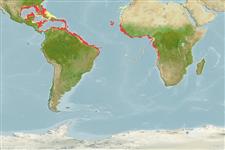Common names from other countries
分类 / Names
俗名 | 同种异名 | Catalog of Fishes(属, 种) | ITIS | CoL | WoRMS | Cloffa
Environment: milieu / climate zone / depth range / distribution range
生态学
海洋 礁区鱼类; 深度上下限 ? - 650 m (Ref. 3686), usually 50 - 300 m (Ref. 26999). 亞熱帶的; 30°N - 14°S, 98°W - 15°E (Ref. 34024)
Western Atlantic: off the continental coast from Florida, USA and the Gulf of Mexico to northern South America, including islands in the Caribbean. Eastern Atlantic: off Senegal to Angola.
西大西洋: 外海的來自美國的佛羅里達與墨西哥灣到的大陸沿岸南美洲北部, 在加勒比海的包括島。 東大西洋: 塞內加爾外海到安哥拉。
大小 / 重量 / 年龄
Maturity: Lm ? range ? - ? cm
Max length : 94.0 cm TL 雄鱼/尚未辨别雌雄; (Ref. 40637); common length : 50.0 cm TL 雄鱼/尚未辨别雌雄; (Ref. 5217); 最大体重: 8.5 kg (Ref. 40637)
背棘 (总数) : 0; 背的软条 (总数) : 109 - 117; 臀棘: 0; 臀鳍软条: 86 - 90. Body completely covered with small, imbricate, cycloid scales; barbels present on snout (6) and chin (6); branchiostegal rays 8; median basibranchial tooth patch absent; developed gill rakers on first arch 4 or fewer; pelvic fin rays inserted at about level of preopercle, well behind eye (Ref. 34024). Ventral fins dark, gradually becoming darker at the extreme blackish edge (Ref. 13608).
身体完全地覆盖着小的,重叠成瓦状的,和圆形的鳞片了; 触须位于吻 (6) 与下巴之上;(6) 鳃条骨 8; 中动脉基鳃骨齿列不存在; 在第一鳃弓 4 或较少数上的发展的鳃耙; 于大约前鳃盖骨的水平插入的腹鳍鳍条, 在眼正后方。 (参考文献 34024) 腹鳍黑的, 逐渐地在极端的黑色边缘变得比较黑的.(参考文献 13608)
Common species (Ref. 34024). Adults benthopelagic (Ref. 34024) down to 650 m, but most often on the continental shelf (Ref. 3686), on sandy and muddy bottoms (Ref. 2683). Juveniles common in reefs (Ref. 34024). Smaller silvery specimens taken far out at sea in the epipelagic (Ref. 34024). Oviparous, with oval pelagic eggs floating in a gelatinous mass (Ref. 205).
普遍的种.(参考文献 34024) 成鱼大洋底栖性鱼种 (参考文献 34024) 向下至 650 公尺, 但是最时常在大陆架 (参考文献 3686) 上, 在沙泥底上.(参考文献 2683) 稚鱼常见于礁。 (参考文献 34024) 比较小的银色标本在表层带取自远外海了。 (参考文献 34024)
Life cycle and mating behavior
Maturities | 繁殖 | Spawnings | Egg(s) | Fecundities | 仔鱼
西大西洋: 外海的來自美國的佛羅里達與墨西哥灣到的大陸沿岸南美洲北部, 在加勒比海的包括島。 東大西洋: 塞內加爾外海到安哥拉。
Nielsen, J.G., D.M. Cohen, D.F. Markle and C.R. Robins, 1999. Ophidiiform fishes of the world (Order Ophidiiformes). An annotated and illustrated catalogue of pearlfishes, cusk-eels, brotulas and other ophidiiform fishes known to date. FAO Fish. Synop. 125(18):178p. Rome: FAO. (Ref. 34024)
CITES (Ref. 128078)
Not Evaluated
人类利用
渔业: 低经济; 游钓鱼种: 是的
工具
特别资料
下载 XML
网络资源
Estimates based on models
Preferred temperature (Ref.
115969): 12.5 - 26.5, mean 19.7 (based on 331 cells).
Phylogenetic diversity index (Ref.
82804): PD
50 = 0.5156 [Uniqueness, from 0.5 = low to 2.0 = high].
Bayesian length-weight: a=0.00372 (0.00180 - 0.00768), b=3.15 (2.96 - 3.34), in cm Total Length, based on LWR estimates for this species & (Sub)family-body (Ref.
93245).
营养阶层 (Ref.
69278): 3.9 ±0.6 se; based on size and trophs of closest relatives
回复力 (Ref.
120179): 中等的, 族群倍增时间最少 1.4 - 4.4年 (K=0.19).
Fishing Vulnerability (Ref.
59153): Moderate to high vulnerability (52 of 100).
Climate Vulnerability (Ref.
125649): High vulnerability (65 of 100).
